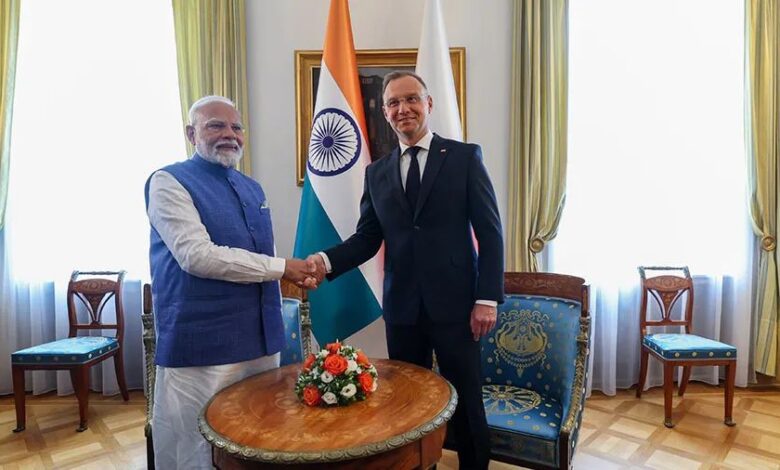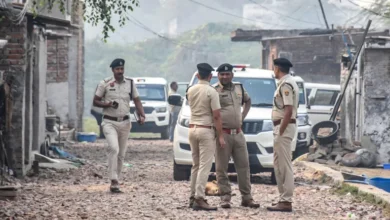A Promising Resurrections of India-Poland Bilateral Relations

India’s Prime Minister Narendra Modi’s recent visit to Poland, which is being hailed as a historic visit by the Indian PM in nearly half a century, is expected to unfold in the future as an exemplary of strategic partnership and bilateral cooperation. The visit marked the 70th anniversary of the diplomatic ties between the two nations, with both sides re-emphasizing their commitment to shared values of democracy, freedom, and a rules-based international order.
An important characteristic of this meeting was a time-bound action plan for dedicated engagement rather than the “seemingly active” superficial and empty promises. Both parties agreed to a five-year Joint Action Plan for 2024-2028. This will be operationalized by providing a platform for political dialogue through regular meetings between foreign ministers both bilaterally and at international forums. The two parties will also hold regular consultations on security and defense, with a special focus on the modernization of military equipment and defense industry connections. Given the commitment to democracy promotion, the leaders on both sides have also agreed that expanding exchanges and cooperation between their legislatures will significantly deepen bilateral ties and mutual understanding.
PM Modi’s visit also acts as an indicator that the emerging market economies are not only interested in seeking assistance and favors from the major developed economies of Western Europe, but they believe in pursuing their independent policies with Central and Eastern Europe as well. This “look beyond the West” approach of India is especially relevant for the multilateral global order.
Defense, Trade, and Technology
The leadership from the two nations discussed their commitment to strengthening the collaboration on the defense and security front. Donald Tusk, PM of Poland, has expressed his interest in becoming a significant player in India’s domestic defense production market, aiming at its modernization. The task force also intends to look into boosting economic cooperation in the fields of technology, agriculture, connectivity, mining, energy, and environment. They have also expressed their desire to strengthen bilateral cooperation in the field of cybersecurity to enhance stability and trust.
Cooperation on climate and International Law
The coordination between the two also extends to envelope current global challenges related to climate change and partnership in climate action initiatives. This also involved India encouraging Poland to get membership in the International Solar Alliance (ISA) and the Coalition for Disaster Resilient Infrastructure (CDRI). The decree to democratize the international order is reflected in their commitment to a free, open, and rules-based Indo-Pacific in tandem with the international law of the sea as given in UNCLOS, ensuring full respect for the sovereignty, territorial integrity, and freedom of navigation for the maritime security and international peace and stability.
Economy, Private sector, and businesses
The agreement on social security to enhance the movement of skilled workers across the two nations was an important highlight of the visit. PM Modi also took advantage of the visit to engage with the private sector and bolster engagement with international corporations. PM Modi met with Gawel Lopinski, CEO of Billenium Pvt. Ltd., a prominent Polish IT company with a presence in western India, to deliberate on the company’s growth plans in India. This also holds potential for more bilateral opportunities in developing technologies, artificial intelligence (AI), cybersecurity, and the digital economy. He also met other Polish corporate giants like Alina Posluszny , the Managing Director of TZMO India, which is the largest Polish investor in India to explore future cooperation and investment opportunities.
Kabbadi diplomacy
The visit not only signifies the strengthening of economic and defense ties but also strong historical bonds of cultural exchange between the two nations. The two nations have long ties on the soft power front, with a few Indian receiving Polish national awards in the field of literature. The ties have also extended to the field of games and sports. PM Modi, in his speech, highlighted that Kabbadi has emerged as a source of connection given that Poland was the host of the Kabaddi championship for the first time in August 2024. The game has reached from the interior pockets of India to Central Europe, with Polish people taking the Indigenous Indian game to newer levels, given that Poland has been the European kabaddi champion for two consecutive years.
Despite the stagnation of political relations between the two nations due to a lack of political engagement and substance despite cordiality, the current visit is a resurrection of their dormant yet extremely potential multi-dimensional ties, whether economic, political, cultural, or the security front. The new chapter of alignment, with palpable action plans as envisaged through the 5-year task force, is a frontier of multi-dimensional collaboration between the two emerging economies with its own unique flair.













